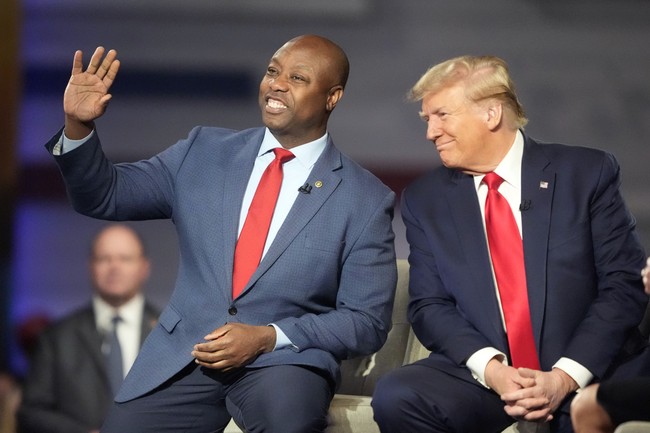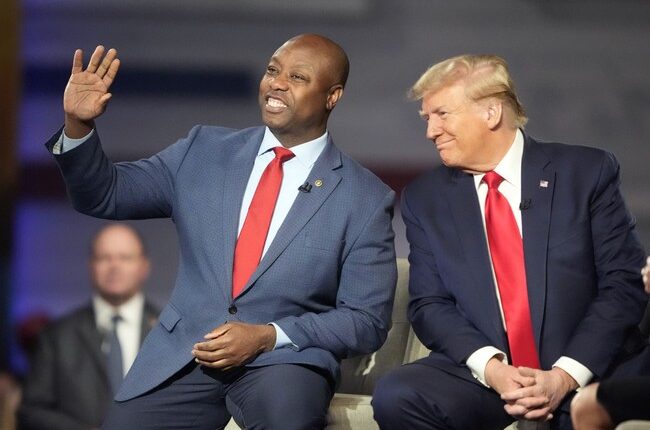South Carolina Sen. Tim Scott, the chairman of Banking, Housing and Urban Affairs Committee, said on the Senate floor Wednesday:
Discussing overdrafts is an essential topic, especially for individuals like myself who have come from a background of financial hardship, raised by a single parent, and understand the struggles faced by single mothers trying to make ends meet.
The recent Senate decision involved a Congressional Review Act resolution, a procedure that allows a simple majority vote in both chambers to nullify a regulation set by the executive branch. This resolution does not require the President’s approval.
In reality, many people rely on overdraft protection on their checking accounts as a form of short-term borrowing, even though it incurs fees. This option is often more favorable than facing charges and interest rates associated with payday loans or credit cards.
CFPB Director Rohit Chopra said when the cap was posted: “The CFPB is cracking down on these excessive junk fees and requiring big banks to come clean about the interest rate they’re charging on overdraft loans.”
The reality of reducing the overdraft fee to $5 is that banks will just remove the overdraft loan option.
Arkansas Republican Rep. J. French Hill, chairman of the House Financial Services Committee, leads the House effort.
Hill said in a Feb. 13 statement that he was acting against the CFPB rule and its rule-making process.
“Tim Scott and I were clear when we told federal agencies–including the CFPB–to stop all midnight rulemaking, which former Director Chopra blatantly disregarded,” the chairman said.
“The CFPB needs guardrails on its enforcement and rulemaking powers, and this rule is another clear example of why,” he added. “Chairman Scott and I will continue to work with our fellow Republicans to rein in the agency with statutory direction.”
Scott said what was at stake was preserving access to the banking system for all Americans.
 “That sometimes includes, as it did for us, free checking,” he said. “A free checking account is not free, but with the revenue streams coming into the institutions, they can use those revenues as an option to provide free checking for those living paycheck to paycheck.”
“That sometimes includes, as it did for us, free checking,” he said. “A free checking account is not free, but with the revenue streams coming into the institutions, they can use those revenues as an option to provide free checking for those living paycheck to paycheck.”
In his Senate floor remarks, the Palmetto State’s junior senator also cited a 2021 academic study conducted by the New York Federal Reserve, “Who Pays the Price? Overdraft Fee Ceilings and the Unbanked,” whose findings aligned with the senator’s own life experience.
“We find no evidence that being banked weakens households’ broader credit health, including delinquency, indebtedness, and credit scores,” the authors wrote. “We conclude that overdraft fee caps hamper, rather than foster, financial inclusion.”
The CFPB rule was published Dec. 12, 2024,, and scheduled to go into effect Oct. 2025, in a flurry of regulatory rules and actions by the administration of President Joseph R. Biden Jr. In addition to the cap on overdraft fees, the CFPB was seeking legal redress over fees from the Navy Federal Credit Union, Wells Fargo, Regions Bank, and Atlantic Union.
The rule was strictly performative at one level, given that voters were returning President Donald J. Trump, a long-term opponent of the CFPB and its banking regulations, to the White House.
Warren, Obama created CFPB
The CFPB was conceived by then-Harvard Law Professor Elizabeth Warren, and President Barack Obama championed its inclusion in the Dodd-Frank bill. After he signed the bill on July 21, 2010, Obama empowered Warren as both a senior White House staffer and Treasury Department official to enact the bureau.
 Like Obamacare, despite modifications along the way, Dodd-Frank remains the law of the land, including the CFPB, a testament to Democrats’ willingness to burn their majorities to achieve their agenda.
Like Obamacare, despite modifications along the way, Dodd-Frank remains the law of the land, including the CFPB, a testament to Democrats’ willingness to burn their majorities to achieve their agenda.
In immediately subsequent cycles, Democrats lost the House, Senate, and White House, but Republicans in power dared not risk their seats to undo what Obama and Democrats had wrought.
Trump’s second term, however, offers signs that Republicans have gotten the message.
Musk, Vought flanking CFPB making its last stand
Not only are Capitol Hill conservatives striking at the CFPB cap on overdraft loan fees, but Trump also fired Chopra, which made Office of Management and Budget Director Russ Vought acting bureau director.
Vought proceeded to lay off or fire probationary and contract employees, but federal judges have ordered them back to work–so Vought put them on administrative leave.
Vought ordered all CFPB operations to shut down and invited members of Elon Musk’s Department of Government Efficiency, or now officially, the U.S. DOGE Service, to look under the hood.
Friday, Senior U.S. District of Columbia District Judge Amy Berman Jackson ordered the Trump administration to stop dismantling the bureau, until she could decide what to do next.

















